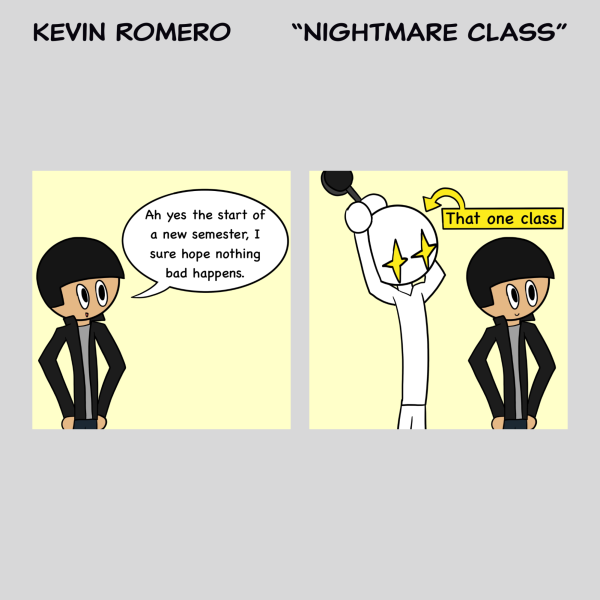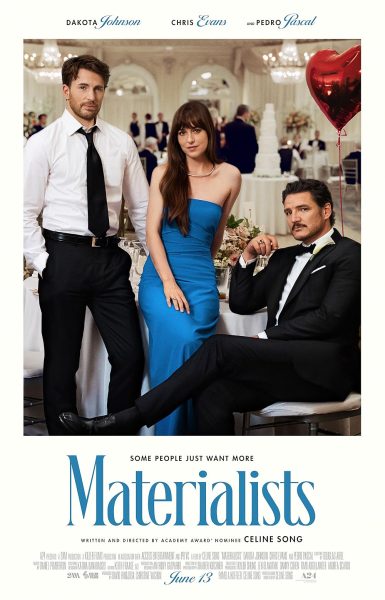“Mass Effect 3” Review
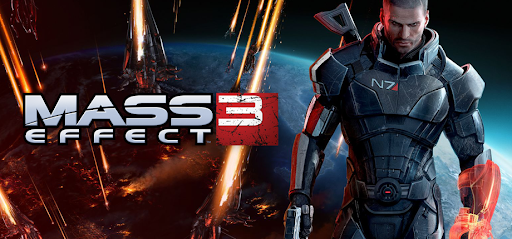
Photo courtesy of store.steampowered.com
Some of you may know that I previously reviewed both “Mass Effect” and “Mass Effect 2” for The Comenian. I enjoyed the first game but I thought that many aspects have aged a lot over the years and it suffered from a lackluster ending. I loved “Mass Effect 2” and thought it improved upon almost every aspect of the first and I had very few issues with it. This will be the last entry of a three-part series reviewing the original “Mass Effect” games for The Comenian with this one finally covering “Mass Effect 3.”
“Mass Effect 3” can be a touchy subject for many fans, mostly because of the divisive ending that remains infamous to this day among gamers. But beyond the ending, the game was mostly well-received because of its excellent combat and otherwise engaging storytelling.
Does this game live up to the legendary “Mass Effect 2” or does it fall short of the mark and fumble across the finish line?
For the most part, I would say “Mass Effect 3” lives up to the second game. This game has some of the roughest edges in the trilogy, but also some of the highest highs and ultimately those positives far outweigh the negatives. Nevertheless, despite the many flaws, this game still stands in the pantheon of best role-playing games and also best sci-fi games.
“Mass Effect 3” is the grand conclusion of the trilogy with higher stakes than ever before. This game carries the legacy of the second game of forging its own identity, as this game leans even more into the aspects set up in the first two games, while also adding its own unique contributions to the universe.
Like I mentioned in my review for Mass Effect 2, these games are much less about rising to the level of the bad guys like other epics are. Even in this game, which has you rallying the entire galaxy to fight the Reapers, you are still massively underpowered when compared to the Reaper threat. Throughout the game, you attain war assets that contribute to your galactic readiness and even when it’s at the highest it can be, the game still says your chances of success are 50/50. This isn’t like “Avengers Endgame” where all the good guys come and annihilate all the bad guys. The entire game and specifically the final battle are much more desperate but I’ll dive into that later
Just like the other two reviews, this review will be split into four sections: soundtrack/audio, graphics/art design, gameplay, and finally story.
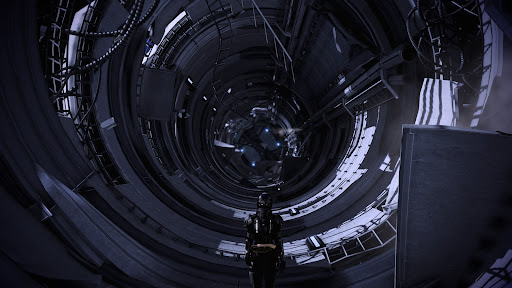
The soundtrack here is pretty easily the best in the series in my opinion. There are some beautiful tracks here and like I mentioned in my review for “Mass Effect 2” the track “Leaving Earth” is incredible and it elicits a powerful emotional reaction because of its somber tone that elevates the tragedies you see on screen. Another track called “An End Once and For All” mimics the melody from “Leaving Earth” but has a distinctly different tone to it. Instead, it takes a slightly more positive tone of relief and salvation, which contrasts the original use in “Leaving Earth.” Liara’s theme, “I Was Lost Without You” is this excellent piano song that acts as a perfect cap to her romance pathway. All in all, the soundtrack in this game just hits on a different level and it perfectly matches the more intimate and emotional nature of the game.
The sound design in this game is even better than in the second game. It’s not as much of a step as the second game took from the first, but it is still a noticeable difference. Guns sound even better, and you can almost feel the impact just from the sound of each shot. As I’m writing this, I can still imagine the different sound effects from the numerous different guns in the game. I didn’t use every weapon, but the ones I did use each had a unique and distinct sound design. The biotic abilities also have great sound effects and feel like they have a significant impact. The new sound design helps to make the game and its combat more satisfying and immersive.
While I do think this soundtrack and sound design is better than the other two games I can’t give it a full 10. Yes, the soundtrack is a significant step up from the second game, but it lacks what it takes to have a 10/10 soundtrack. For me to consider it a masterpiece, there need to be numerous different songs that hit me on an emotional level and that isn’t here all that much besides the aforementioned tracks. When compared to games like “Red Dead Redemption II” and “NieR Automata,” this game simply doesn’t hold a candle.
Score for soundtrack and audio: 9/10
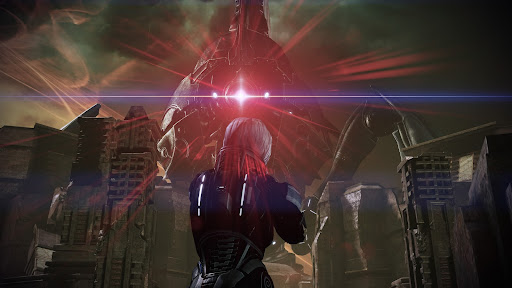
The graphics and art design are also the best in the series. This game was the least affected by the legendary editions remasters, which is just a testament to how good this game originally looked. By now you may have caught on that all the pictures in this review, besides the cover image, were taken by me. This is because the game looks beautiful even nine years later. The set pieces in this game look fantastic, especially when there is a Reaper involved and the final level is one of the most aesthetically pleasing levels I’ve seen in gaming.
Of course, the textures and graphical fidelity are better than the previous game but the direction they took in terms of the art design makes it look even better. Though there is one thing that I take issue with and that is Shapard’s face. Some levels admittedly do look a little bland or repetitive, but when that’s contrasted by missions such as Priority: Palaven, Thessia, or Earth, I can forgive a few lackluster levels. Those aforementioned levels, along with Priority: Tuchanka and Rannoch, are stunningly beautiful at times with awesome and creative setpieces in each.
Each set piece does something different and fresh to keep the different encounters with the reapers from getting stale. On the Palaven mission, you don’t land on the planet itself. Instead, the mission is on one of its moons, which allows the player to see what’s happening on the planet. From this perspective, you see the entire world set ablaze and you understand the mass scale of this war. I won’t spoil any of the others though because they truly are a marvel.
This game sadly doesn’t take as much of a leap forward that the second game did in terms of new and interesting stuff to see. There are no new hub worlds this time around, so you are mostly confined to exploring the citadel in between missions unlike “Mass Effect 2” where you had three different ones: Omega, Illium, and the Citadel.
The SSV Normandy SR2 looks even better this time around. It now ditches the Cerberus colors and becomes an Alliance vessel again. This new coat of paint for the ship may sound minor, but it makes the ship look so much better than it did before, similar to how the Slave I from “Star Wars” looked in “Attack of the Clones” when compared to “Empire Strikes Back.”
Character designs are as strong as ever here. A lot of the designs piggyback off of “Mass Effect 2” though probably because the game had a rushed development cycle and the game takes place only 6 months after the second. Nevertheless, the new character designs look solid.
Score for graphics/art design: 9/10
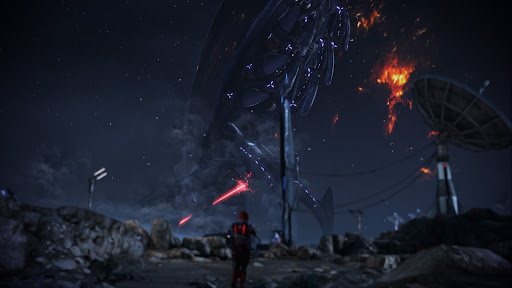
The gameplay here is the strongest in the series. The gameplay is a big step up from “Mass Effect 2” which already had strong gameplay. Everything just feels better from the weapons, melee attacks, and abilities; the developers brought their A-game here and it shows.
Combat here is the most varied in the series and this game provides a copious amount of room to play how you want. Yes, the other two games have different classes and playstyles, but they weren’t quite as well-realized as here. In this game you can play 95% of the game just using your biotic abilities without firing a single bullet, which is just as fun as it sounds. The biotics in this game is off the charts and when combined with the right armor, upgrades, and perks you can become an overpowered war machine the likes of which even a master Jedi would struggle against. In this most recent playthrough, I chose a vanguard and by around 20% through the game, I was able to go on a warpath with my biotic abilities.
This game provides the most flexibility in terms of builds because the abilities on offer here are better than ever before, which makes each class feel even more distinct, since you can rely on those abilities even more. Like I said before, biotics are crazy in this game. Both new abilities and old ones get a massive upgrade in this game and if you specialize your character right they can be completely overpowered. To put this into perspective, I spent the entire final fight of this playthrough without firing a single bullet. The abilities and classes in this game are just so much more fun than before, because they have much more variety than the other two games. Despite my obsession with biotics, the shooting mechanics in this game are also fantastic. Shooting is smooth and feels like it has a weight to it that the other games don’t.
This game gives a little more room to specialize your class and your gameplay when compared to the second game. No longer are you completely locked from certain weapon types which was a huge relief to me, as I sorely missed using a sniper in “Mass Effect 2.” Instead, they introduced a weight system for your weapons, so the more weight you have, the slower your abilities recharge. This creates a choice and consequence system with the gameplay where every positive comes with a tradeoff. If you want to have every weapon type on your character then you have to deal with slow recharge times for your abilities; conversely, if you want fast recharge times for abilities then you’ll have to be less versatile in your weaponry.
The conversation system remains unchanged; I won’t comment on it much here, but there is one major issue that arises in this game with the system, but it’s more to do with the writing rather than the system itself.
One little nitpick I have is that the default difficulty for this game is easy mode instead of normal for some reason, so on my first playthrough I accidentally played the game for 20 hours without any real challenge. This game also has the hardest enemies in the series so as long as you change the difficulty, there is a fairly engaging challenge.
Score for gameplay: 9/10
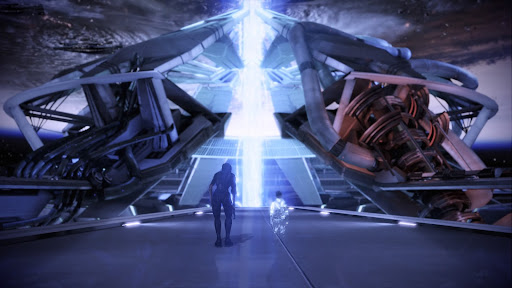
Photo courtesy AJ Minnich
The story is the most contentious aspect of this game mainly because of the ending. I’ll get into that later, but for now, this game still has a great story despite the mixed ending. It certainly has some of the roughest edges in the trilogy though but the massive highs here outweigh the lows.
First, I’ll talk about my criticisms of the story and then I’ll talk about what I like.
First off, the renegade options in this game are not very good or consistent. If you are going to play a full renegade playthrough be ready for some uneven decisions. In the previous games, renegade options were usually more ruthless, but they wouldn’t necessarily be “bad.” Here though, sometimes renegade options can either be more ruthless like the other two games or you can literally commit genocide. I don’t know about you, but there’s a massive difference between being more of a jerk and completely dooming an entire race of people. This reveals a big issue with the game’s binary morality system, which is that it leaves little room for nuance. For the most part, this system works well in the “Mass Effect” games, but in the third game, you are tasked with making the biggest decisions in the series which makes it difficult to have that nuance when there are only two options. When your only two options are good and evil it’s obvious which one you probably are gonna pick. In the first two games, the renegade options still had a good case, but here some of them are downright monstrous. Hopefully, the next game in the series will be able to retrofit this system so that there is a little more nuanced decision-making.
Second, the lack of multiple hub worlds was disappointing. In the second game, you could explore the Citadel, Illium, and Omega but here you only have the Citadel. To be fair, the Citadel areas are significantly larger than they were in the second game, but nevertheless the ability to explore and interact with different hub worlds is missed. I understand that in the context of the story it would have been hard to have multiple hub worlds when almost every possible one is under attack, but the variety the multiple hubs provided is still sorely missed.
The third is the biggest problem I have and that is the limited number of squadmates. In “Mass Effect 2” there are 12 squadmates whereas here there are only seven. Even worse is that none of the squadmates introduced in the second game are on your crew in the third. The only ones from “Mass Effect 2” that carry over are Garrus and Tali, who were already in the first game. I would be more understanding if the characters from 2 had better reasons for not being on the Normandy but Zaeed, Samara, Miranda, Grunt, Jacob, and Kasumi all have poor reasons for not accompanying you on the Normandy. Some of the members from 2 such as Mordin, Thane, and Legion are understandably absent. A lot of the absent members claim to have business or need to organize contacts, but this line of logic isn’t entirely consistent since Tali is an admiral on the Quarian fleet and Liara is one of the most powerful and influential people in the galaxy, so if they can still be apart of the Normandy, all those other characters can. Thankfully, the new squad members are pretty good, but one of them was in the second game as a supporting character, so ultimately there are only two real new squadmates. James Vega is fine, but a bit boring and underdeveloped. This is true for most of the human squad members, but Vega has some interesting quirks that make him enjoyable and Javik is a very good addition to the game and he provides incredibly unique conversations and insights. Still though, not having any of the new characters from 2 was a big disappointment especially when this game is the longest of the three.
Now I need to address the ending. Even today the ending to the game is widely thought to be one of the worst conclusions to a franchise in gaming history. Personally, I think that’s a bit hyperbolic, but I do have one big issue with it. Minor spoilers ahead for the ending of “Mass Effect 3” I will be discussing the choices you are given at the end, but not any other major plot details. At the end, the game gives you three major choices.
Option one: Destroy the Reapers but also all synthetic life. Option two: Control the Reapers but your Shepard will die and become an AI to manage them. Or option three:Fuse both synthetic and organic life but your Shepard will die.
Those first two I am fine with, but synthesis is where my problem lies, because it’s objectively the best and most peaceful option, but it’s also the least satisfying. This ending simply feels too perfect. There really aren’t any major consequences to this and it just feels contrary to everything the series has built over the three games. Morally speaking, this would be the best option, but it simply doesn’t fit in a series like this. The game should have just had the destroy option or the control option, which would have made it a much better ending.
Beyond the final decision, though, the rest of the ending is fantastic. The final mission in this game is beyond perfect and rivals “Mass Effect 2” in that department. It may not be as intricate and well crafted as in 2, but it makes up for it with a much more heart-pounding and emotional finale. Coming back to Earth in an apocalyptic state is a shocking sight to see. Saying your goodbyes to all your squadmates across the trilogy felt like a punch to the gut, because by the time you get to this point, they don’t feel like regular sci-fi characters, and it feels like you are saying goodbye to long-time friends. I can’t emphasize enough how well-written the characters in all three games are. Almost every character is engaging, relatable, and has a well-written character arc. Throughout these three games, you get to know your crew inside and out and grow strong emotional bonds with them, so saying goodbye after spending over 100 hours with them was not only emotional but also gives the game a definitive sense of finality.
Right from the start, this game feels like the final act as the stakes are higher than ever before. The beginning very effectively establishes the incomprehensible threat you face as the Reapers break through Earth’s fleet and defenses in minutes and start decimating the planet. You see immediately the nearly hopeless odds you fight against, which establishes a large sense of urgency. This is something that all three games were good at doing because they all effectively establish why the enemy you face is so dangerous and each game ups the stakes.
Every part of the main plotline feels like it provides closure to all the major aspects set up in the previous two games. Every inkling of a plotline is resolved here and this game is where your decisions throughout all three games matter the most. Depending on your choices and actions, there will be completely different outcomes across the numerous arcs throughout the game, so it does feel like everything you’ve done in these games did matter in the grand scheme of the narrative. It almost feels like going down memory lane and not in the cheap nostalgia bait way, such as in “Star Wars: Episode IX – The Rise of Skywalker” but more in a way to reflect on the entire trilogy and reminisce on why people fell in love with this trilogy to begin with.
The conflict in this game is also really interesting. This isn’t because it’s between two different sides with their own complex view, but because it’s not. You have the Reapers trying to wipe out galactic civilization, which on its own sounds boring and lame, but it’s in fact genius. By having the main villains be these indomitable foes that are impossible to understand, it shifts the nature of the conflict from being a lack of human reason to being the ultimate tale of David and Goliath wherein Goliath is now an unknown and incomprehensible enemy. The enemy themselves aren’t inherently interesting, but they are intimidating and the grounds this war is fought on is different than most other stories.
The side missions are very well done, just like “Mass Effect 2,” and also play into that memory lane I mentioned earlier as they mostly exist to provide closure to the characters and loose plot threads from previous games. Except for one, all of them provide excellent resolutions and show how far you and your crew have come since the first mission on Eden Prime in “Mass Effect 1.”
Characters in this game are well written as always, but this time around everything feels so much more personal. Because of the dispersity of the main conflict and mass tragedies that occur, a lot of the layers are peeled back with these characters. Because of this near hopeless battle, it becomes more important for these characters to confide and build strength in each other. More than the other two games, going into this final mission felt a lot more emotional because of the bonds that were built in this game, and that it was the last stand for all these characters you’ve grown to love. The dispersity put these characters in much more compromising positions, and you get to see numerous different sides to these characters, even for the sternest and stoic of them.
Even the player character, Commander Shepard, gets some layers peeled back and you see how they struggle with what is going on in the galaxy and the trauma they’ve endured. This gives the story a tremendous weight and helps emphasize how you hold the entire galaxy on your shoulders. There are no real particular standouts in this game, because there are so many well-written characters and arcs that I can easily see why everyone can come to different conclusions on who their favorite characters are. Mordin confronts the guilt of contributing to the gentile genocide of the Krogan, Liara mourns the loss of her home world along with handling the weight of being one of the most powerful people in the galaxy, Garrus has to adjust to being a leader again while also dealing with not knowing if his family is alive or dead after the Reapers attacked.
While yes, this story does have some rough edges, it also has some of the biggest highlights of the series, which I think overshadows the negatives and creates one of the best stories in gaming and one of my favorite narratives in all of science fiction.
Score for story 9/10
“Mass Effect 3” is an incredible game despite the backlash it got at launch. Even though it’s the longest in the series the game remains consistently engaging and interesting. The fact that I’ve talked about this game for nearly 4,000 words should show how much I love this game and this series as a whole.
Overall score 9/10
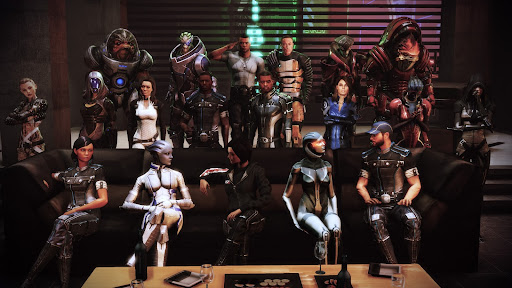
The “Mass Effect” trilogy is by far my favorite series of all time after playing it. From the incredible story and characters to the unique setting and environment, there are very few things that I don’t love about these games. “Mass Effect” reminded me of the power of not only gaming, but storytelling as a whole, and is genuinely one of the most inspiring pieces of fiction to me personally. I adore all three games and they encompass what is my all-time favorite trilogy in fiction. I highly recommend playing and beating all of these games, because they are all amazing in their own way. If you are a gamer, you are actively doing yourself a disservice by not playing these games.
Score for the whole trilogy 9/10





